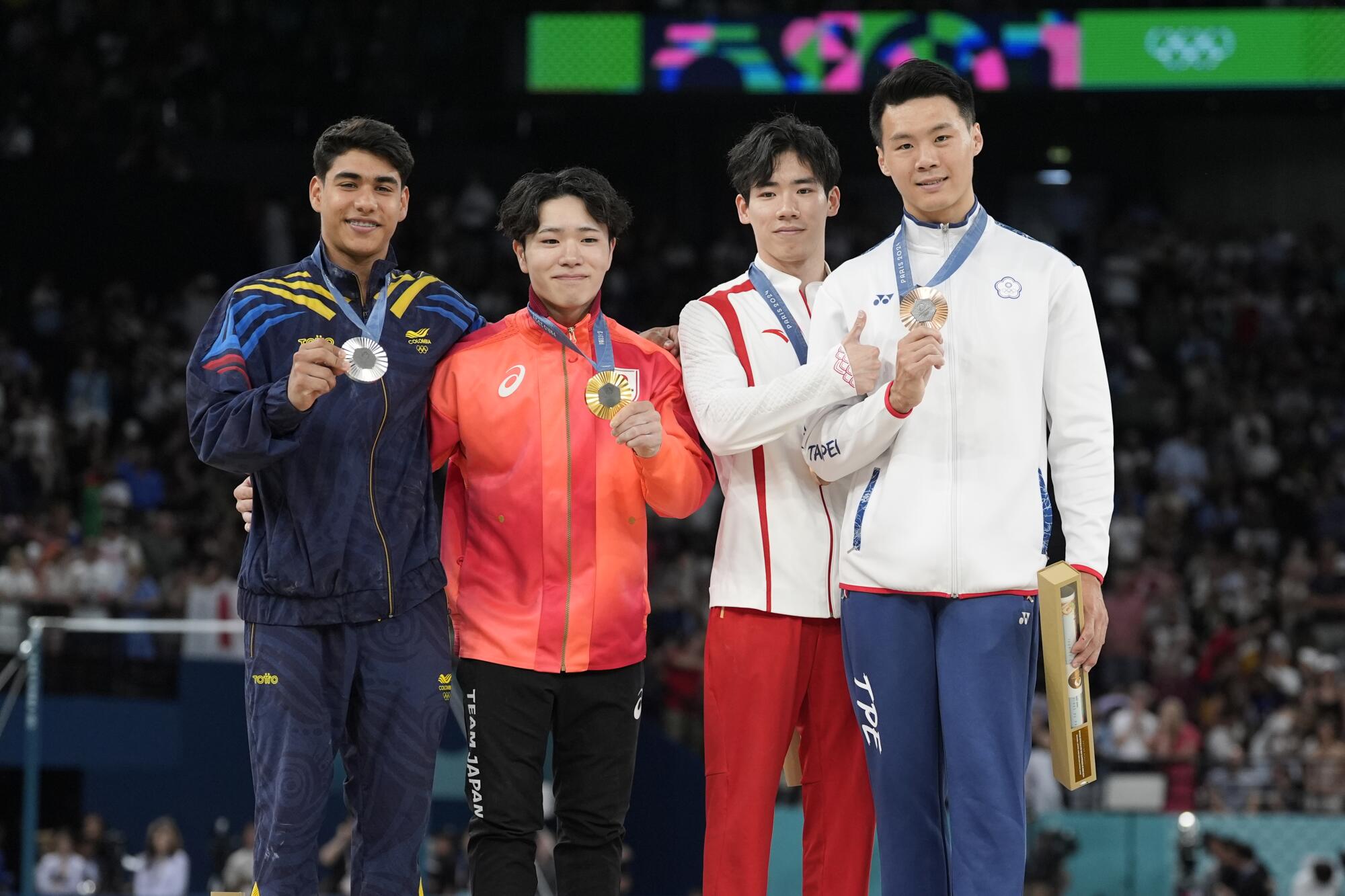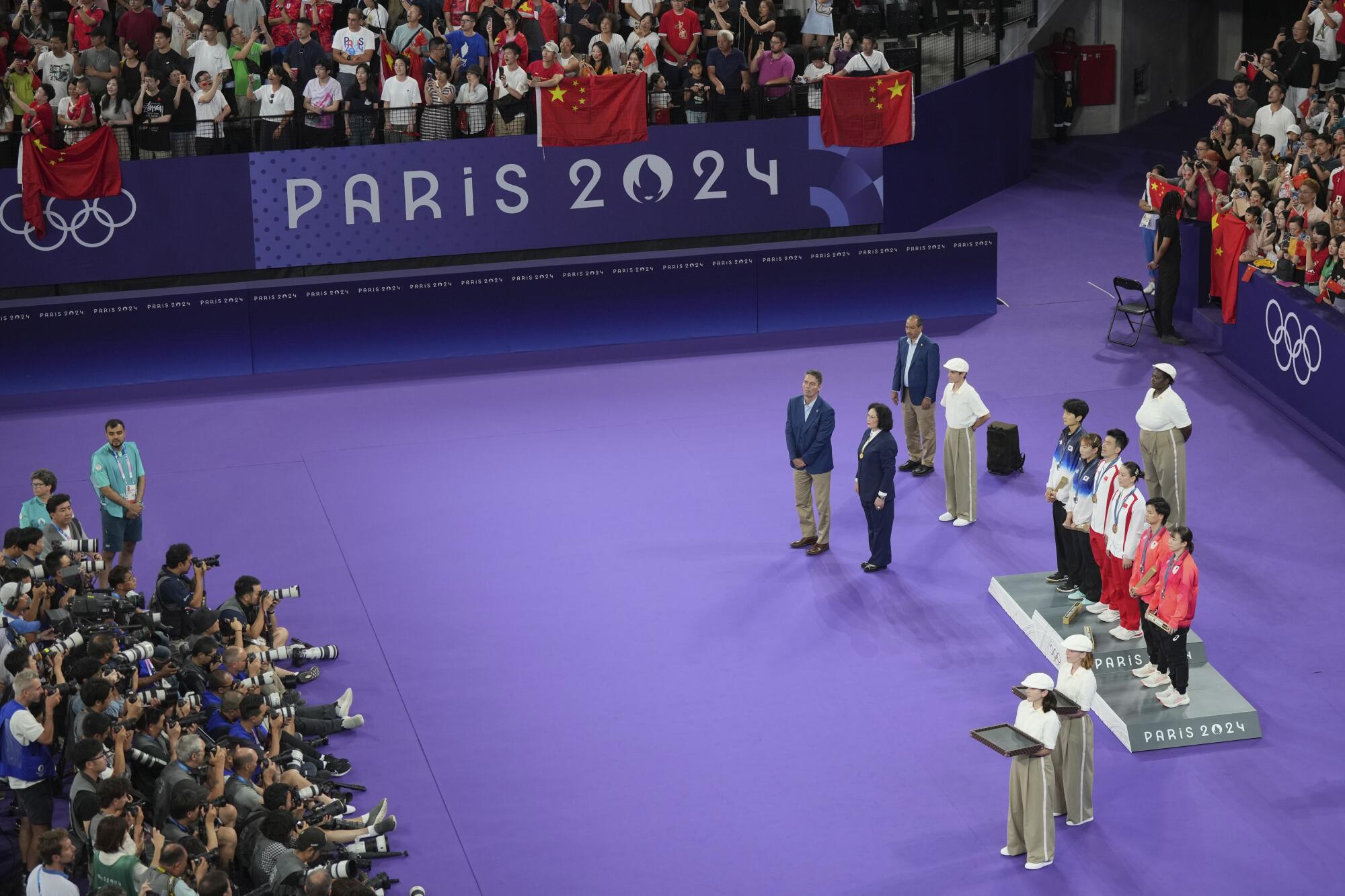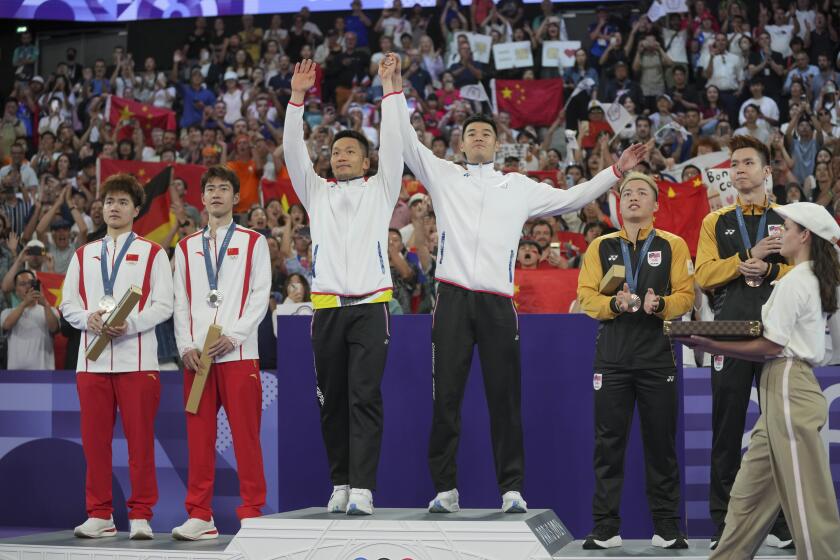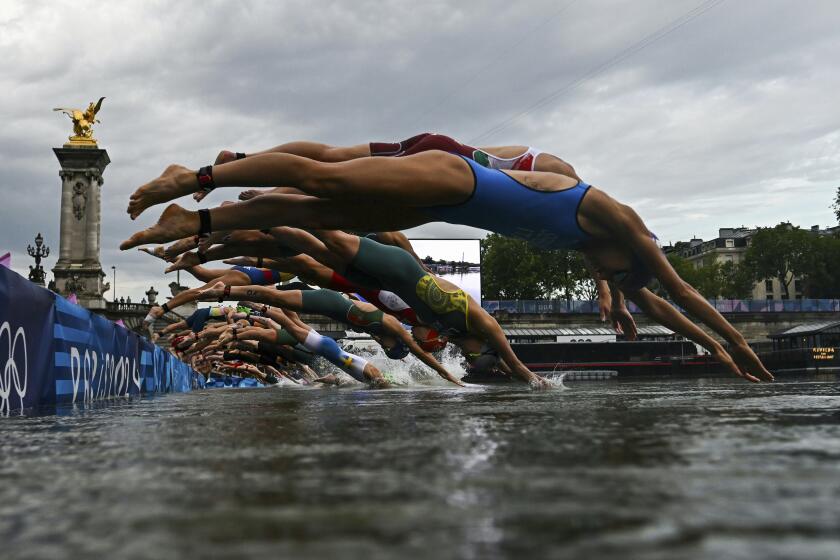
- Share via
NANTERRE, France — On most afternoons, before spectators were allowed inside the swimming venue at the Paris Olympics, seven men and women would silently march on to the pool deck to practice tethering flags to three horizontal white bars suspended from the ceiling.
Their practice was necessary because the task had to be done perfectly. Few moments are more taut with emotion or more fraught with danger than the medal ceremonies at the Olympic Games.
Innocently hang a flag the wrong way — or hang the wrong flag — and what was supposed to be a celebration can become a diplomatic contretemps.
“Our work started more than two years ago,” said Esther Rozenkier, the flag protocol manager for the Paris Olympics. “We make sure every single flag representing every National Olympic Committee, National Paralympic Committee, international sporting federation and other international organizations — 247 different flags in total — is correct and formally approved by each delegation’s representative.
“They approve the way their flag is to be rotated and adapted for a vertical display, how their flag is resized, if necessary. We also identify, for each and every venue what, size and what orientation flag we will be able to display, based on estimated quantities of participating delegations for each sport.”
The attention to detail is important since the smallest error can have major repercussions.
In 2016, organizers of the Rio Games displayed the wrong Chinese flag during two medal ceremonies. The mistake was slight — the flag’s four small stars were parallel to one another rather than pointed at the larger yellow star. But it was enough to offend millions of Chinese people.
“It’s on the fault line of certain tension,” said Mark S. Dyreson, an affiliate professor of history and the director of research and educational programs for the Penn State Center for the Study of Sports in Society. “There have been times when the South Korean national anthem has been played for North Korean athletes. Or back in the day where there were two Germanys, the West German national anthem for the East Germans or a mix-up in flags.
“That why they practice so much now, because then it becomes a scandal. The host nation has insulted some other country [and] it becomes a sort of international incident; it inflames those national tensions.”

Despite the practice, the Paris Games have not been error-free. Near the end of the opening ceremony, the Olympic flag was raised upside down, with the interlocking blue, black and red rings at the bottom instead of the top. Then two days later, before South Sudan’s Olympic basketball debut, the national anthem of Sudan, the country from which South Sudan seceded, was played. That drew jeers from the crowd, but when venue officials moved quickly to fix the mistake and play the correct hymn the forgiving crowd applauded.
Rozenkier said one reason her team takes their work seriously is because the athletes who trained their whole lives to get do the same. And the moment is one she wants them to remember fondly.
“It is a moment in time that cannot be recreated for them,” she said. “In addition to our obligation to the participating countries to get every detail right, I also feel a very strong obligation to each individual competitor to ensure that such a singular moment as medal ceremony is as perfect as possible.”
Dyreson, an Olympic historian, said mistakes were common in the days before the medal ceremonies became so ritualized.
Taiwan’s first Olympic win this year has reignited controversy over the island’s push for self-determination against Chinese control.
“Especially early on, when it was newer and you had just some local band playing, whether they got the music right or the right country was sort of haphazard. Or raising the wrong flag,” he said.
The chance of error has been minimized by the use of recorded anthems. But mistakes still happen. In the 2003 Pan American Games in the Dominican Republic, a U.S. swimmer followed a Canadian to the top of the medal stand but someone forget to change the CD. So “O Canada” played as the Stars and Stripes were raised.
Medal ceremonies now seem as much a part of the Olympic furniture as running tracks and swimming pools but the practice didn’t begin until the 1932 Winter Games, with the idea of a medal pedestal borrowed from the 1930 British Empire (later Commonwealth) Games. And while the International Olympic Committee doesn’t mind nationalism — the whole idea of flag-raising and anthem-playing encourages that — it does enforce rules.
“The IOC is trying to take its protocols from international protocols,” Dyreson said. “They don’t want to be embarrassed. But also they don’t want the kind of controversy that comes with athletes having their own agenda on the medal stand. How athletes dress and behave during their national anthems can can be an issue. These ceremonies could get bad publicity fairly quickly.”
Having a Russian and a Ukrainian, a South Korean and North Korean or a Muslim and an Israeli mount the medal podium together, he said, could get uncomfortable.
“It is a national ceremony, and that’s part of part of the heart and I think the appeal of the Olympics. [But] this mixture of international and national a remains a flash point,” he said.
“It always has the possibility for controversy. Both back in their homeland, in terms of how they behave on the stand, and turning into an international event.”
In fact, Rozenkier said, Olympic protocol trumps state protocol during the Games.
“If you want to participate, you have to agree to this protocol,” she said. “The Olympic flag protocol ensures that all participating delegations are treated equally.”
Many of the Olympic triathletes who swam in the Seine River this week say the current was a much bigger problem than any pollution they encountered.
Despite the potential dangers, Dyreson says the medal ceremonies are a vital and valuable part of the Olympic Games, one the athletes cherish and spectators look forward to. It’s also one that sits at the crossroads of peace and war, a junction where Baron Pierre de Coubertin, the French educator and athlete who established the modern Olympics, believed sports were uniquely positioned to direct traffic.
“It has value because occasionally athletes transcend their national tensions. Nations that are bitter enemies, the athletes hug one another and celebrate with one another,” Dyreson said. “There’s plenty of examples of that in the Cold War, with American and Soviet athletes or Eastern Bloc athletes celebrating. But you can all also have these diplomatic snafus.
“This is part of the excitement of the games, right? That they’re both national and global at the same time, which is inevitably bound to create conflict.”
In the meantime, keep practicing. Because raising the wrong flag can mean raising a red flag.
More to Read
Go beyond the scoreboard
Get the latest on L.A.'s teams in the daily Sports Report newsletter.
You may occasionally receive promotional content from the Los Angeles Times.









